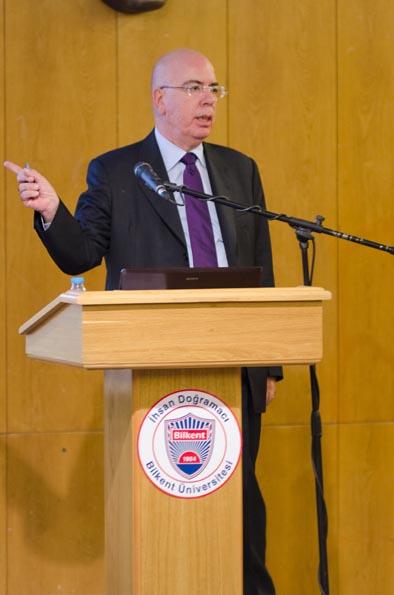Former Central Bank President Examines Causes of the Current Account Deficit
BY HALİL AKBULUT (LAW/II)
On October 11, Süreyya Serdengeçti, former president of the Central Bank of the Republic of Turkey, gave a presentation entitled "Balance of Payments" as the first guest speaker in the "Savings & Growth" series being held by the Economic Research Society.
Mr. Serdengeçti, who had previously visited Bilkent University on February 22 to discuss monetary policy, first reviewed the main points of his talk on that date, as both presentations had some topics in common, such as the current account deficit and hot money (defined as short-term capital inflows). Following this, he focused primarily on the current account deficit, noting that it is influenced by many factors, such as exchange and interest rates, and the balance between short- and long-term capital inflows.
Photograph by Murat Can Yıldız (MAN/III)
However, he stated, the factor having the greatest impact on the current account deficit is the savings rate. Mr. Serdengeçti contended that the deficit has been continuing to increase in recent years, despite the measures that have been taken by the Central Bank and the government, due to the country's low savings rate and also its dependence on imported energy. But if this dependence can be reduced and the savings rate increased by making some policy changes, he said, the deficit is not fated to continue on an upward trend.
Mr. Serdengeçti also pointed out the fact that, on the positive side, the current account deficit is an important indicator of Turkey's economic growth, and to an extent a result of the sense of confidence growth has brought with it. The deficit derives in part from the demand for foreign capital and also for housing -- that is, from situations calling for increased investment at the same time as the savings rate is decreasing.
He concluded by saying that it is obvious that Turkey's economy has been growing fast in recent years, but measures that would enable the savings rate to increase should be put into effect. After his presentation, Mr. Serdengeçti took questions from the audience, most of which concerned what policies would be beneficial for the Turkish economy.
